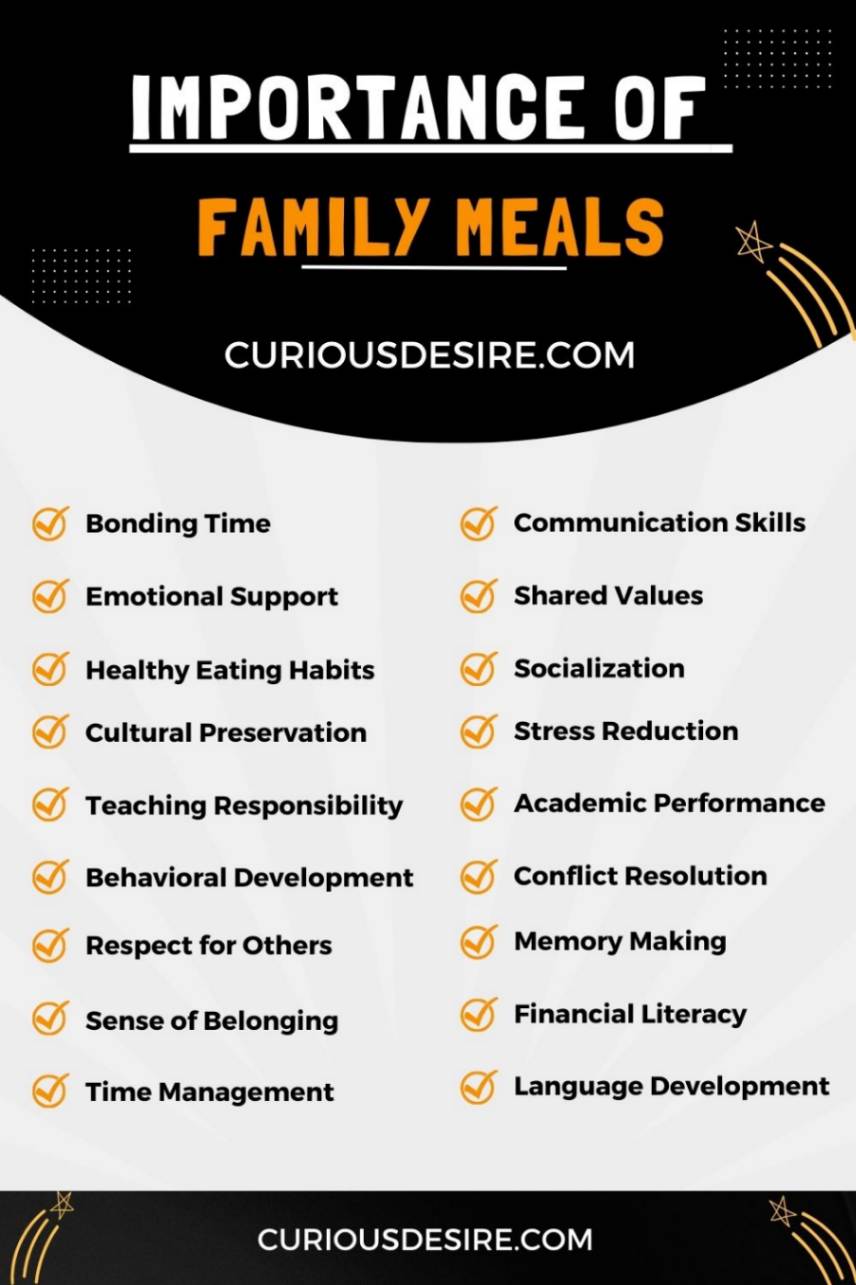In today’s fast-paced world, where everyone seems to be constantly on the go, the simple act of gathering around the table for family meals often gets overlooked.
However, these moments of togetherness hold immense importance in shaping the dynamics of a family and nurturing relationships.
In this article, we explore the importance of family meals, examining why they matter and how they contribute to the overall well-being of individuals and families alike.
We have outlined 20 key reasons why family meals are essential, covering aspects such as promoting communication skills, promoting healthy eating habits, and strengthening familial bonds.
Through this exploration, we aim to highlight the multifaceted benefits of prioritizing family meals in our daily lives.
Here are the 5 effective reasons for the importance of family meals:
- Bonding Time
- Healthy Eating Habits
- Socialization
- Cultural Preservation
- Personal Development

1. Bonding Time
Bonding time during family meals is important because it strengthens the connection between family members.
When we eat together, we share experiences, stories, and laughter, which helps us understand each other better. This closeness builds trust and creates a sense of belonging within the family.
For example, when everyone sits down for dinner and talks about their day, it creates an opportunity for parents to listen to their children and vice versa, promoting open communication.
Additionally, shared meals provide a chance for family members to show support and care for each other, strengthening the bonds that hold the family together.
Overall, bonding time during family meals brings everyone closer and creates a strong, loving family unit.
2. Communication Skills
Effective communication is important during family meals as it nurtures understanding and connection among family members. Engaging in conversations over meals allows individuals to practice the following:
- Active Listening: Attentively listening to family members without interruption, fostering empathy and understanding.
- Articulating Thoughts: Expressing ideas clearly and coherently, enhancing communication proficiency.
- Respecting Differing Viewpoints: Valuing and considering diverse opinions, promoting open communication and mutual respect.
- Building Confidence: Engaging in conversations boosts self-assurance in expressing thoughts, contributing to overall communication skills development.
For instance, when siblings discuss their school projects or parents share stories about their day, it creates opportunities for meaningful dialogue and strengthens communication skills.
This promotes an environment where everyone feels valued and heard, promoting harmony and cooperation within the family dynamic.
3. Emotional Support
Sharing meals offers a comforting space where family members can openly express their feelings, seek guidance, and receive empathy from one another.
Whether celebrating achievements or handling challenges, the shared experience of dining together promotes a sense of closeness and solidarity.
For example, during difficult times, such as illness or loss, gathering around the table provides a source of strength and reassurance as family members offer words of encouragement and support.
This emotional bond nurtures resilience and promotes a strong sense of belonging within the family.

4. Shared Values
Family meals play a pivotal role in strengthening and celebrating shared values, beliefs, and traditions. Through rituals and customs associated with mealtime, families transmit cultural heritage and uphold cherished principles.
These points highlight how family meals help preserve cultural practices and traditions.
- Observing Religious Practices: Participating in religious rituals during meals preserves cultural practices and strengthens faith-based values.
- Honoring Cultural Traditions: Celebrating cultural festivals or customs maintains cultural heritage and passes down ancestral traditions.
- Passing Down Family Recipes: Sharing and preparing family recipes sustains culinary traditions and strengthens familial bonds.
- Cooking and Enjoying Traditional Dishes Together: Collaboratively preparing and enjoying traditional meals promotes pride in cultural identity and strengthens intergenerational connections.
For example, cooking and enjoying traditional dishes together not only nourishes the body but also serves as a means of preserving cultural heritage and promoting intergenerational connections.
By embracing shared values during meals, families cultivate a sense of unity and belonging that transcends individual differences and fosters mutual respect.
5. Healthy Eating Habits
Ensuring healthy eating habits is a key reason why family meals matter. When families dine together, parents have the opportunity to guide their children toward nutritious food choices, such as vegetables, fruits, and whole grains.
Consistently sharing balanced meals helps children develop an appreciation for healthy foods and cultivates lifelong habits that can prevent health problems later in life.
For instance, sitting down together for dinner allows parents to introduce new foods and serve as positive role models for healthy eating behaviors, encouraging their children to follow suit.
By prioritizing health and well-being through family meals, families not only nourish their bodies but also strengthen their bonds.
6. Socialization
The importance of family meals lies in their ability to facilitate socialization and promote meaningful connections among family members.
Gathering around the table provides a designated time for everyone to share stories, laughter, and experiences, promoting communication and bonding.
For example, engaging in conversation during dinner encourages family members to listen attentively, express themselves, and show empathy toward one another.
These moments of connection create a supportive environment where everyone feels valued and understood, strengthening the fabric of the family unit and nurturing relationships that endure beyond the dinner table.
7. Cultural Preservation
Family meals play a vital role in preserving cultural heritage and passing down traditions from one generation to the next.
When families come together to prepare and enjoy traditional dishes, they celebrate their cultural identity and honor their heritage.
Cooking ancestral recipes together and sharing stories about their origins allows family members to connect with their cultural roots and develop a sense of pride in their cultural heritage.
These shared experiences not only create lasting memories but also strengthen the family’s cultural identity, fostering a sense of unity and belonging across generations.
Through the practice of cultural traditions during meals, families strengthen their bonds and enrich their shared heritage, ensuring that their cultural legacy endures.
8. Stress Reduction
One significant benefit of family meals is their role in reducing stress levels within the family.
Gathering together for meals provides a designated time for relaxation and connection, allowing family members to unwind and share their experiences of the day.
For instance, engaging in lighthearted conversation and laughter during dinner can alleviate tension and create a sense of calm.
By prioritizing shared meals, families create a supportive environment where members can lean on each other for emotional support, ultimately reducing stress levels and promoting overall well-being.
9. Teaching Responsibility
Another important aspect of family meals is their contribution to teaching responsibility, particularly among children and adolescents.
Involving children in meal preparation, setting the table, and cleaning up afterward develops a sense of ownership and accountability.
For example, assigning tasks such as chopping vegetables or washing dishes teaches children the importance of contributing to the family and taking responsibility for their actions.
Through these everyday responsibilities, children learn valuable life skills that extend beyond the kitchen, preparing them for independence and self-reliance in the future.
10. Academic Performance
Family meals also play a significant role in enhancing academic performance among children and adolescents.
Sitting down together for meals provides an opportunity for parents to engage in meaningful conversations with their children, offering guidance and support for academic endeavors.
For instance, discussing school projects or homework over dinner allows parents to provide assistance and encouragement, promoting a positive attitude toward learning.
Additionally, the structure and routine of family meals can contribute to better time management skills, leading to increased focus and productivity in academic pursuits.
11. Behavioral Development
Regular meals together play a significant role in shaping the behavior of children and adolescents. These shared meals establish routines and expectations that promote positive conduct.
For example, simple rituals like setting the table or saying grace teach children discipline and manners.
Additionally, mealtime conversations provide parents with opportunities to model respectful behavior, strengthening values like kindness and consideration.
Consistent exposure to these positive behaviors during family meals helps children internalize these values, leading to the development of respectful and responsible behavior both within the family and in other social settings.

12. Conflict Resolution
Mealtime gatherings offer a unique space for practicing resolution skills within the family. As family members come together, conflicts may arise, presenting opportunities for resolution in a safe environment.
Through managing disagreements together during meals, family members learn vital skills such as active listening and compromise, promoting harmonious relationships and strengthening familial bonds.
These experiences of conflict resolution during meals provide children with valuable lessons in communication and negotiation that they can apply to resolve conflicts in other areas of their lives, such as school or friendships.
13. Respect for Others
Sharing meals fosters mutual respect among family members, encouraging consideration for each other’s needs and opinions.
Taking turns speaking during mealtime conversations teaches children the importance of listening attentively and valuing diverse perspectives.
Cooperation and compromise during meals cultivate empathy and respect for others’ boundaries, nurturing a culture of understanding and connection within the family.
By consistently practicing respect for others during family meals, children learn to appreciate the unique perspectives and contributions of each family member, promoting a sense of inclusivity and harmony within the family unit.
14. Memory Making
Gathering around the table for meals creates cherished opportunities for making lasting memories together.
Whether celebrating special occasions or sharing everyday moments, these shared meals strengthen family bonds and create a sense of belonging.
Sharing stories and laughter during meals builds a tapestry of memories that define the family’s collective identity and history, promoting a deeper connection among family members.
These shared experiences become part of the family’s shared narrative, providing a source of comfort and unity during both joyous and challenging times.
15. Sense of Belonging
Regular family meals contribute significantly to promoting a sense of belonging within the family unit. When families gather around the table to share meals, they create a space where everyone feels valued and connected.
Mealtime conversations allow family members to share stories, experiences, and laughter, strengthening their bonds and reinforcing their connection to one another.
This sense of belonging provides emotional support and security, promoting a positive family dynamic where each member feels accepted and cherished.
16. Financial Literacy
Family meals offer valuable opportunities to teach financial literacy skills to children and adolescents. Planning and preparing meals together provide practical lessons in budgeting, grocery shopping, and meal planning.
For instance, involving children in creating grocery lists and comparing prices at the store helps them understand the value of money and the importance of making informed financial decisions.
Additionally, discussing the cost of ingredients and meal preparation during family meals can further strengthen financial literacy concepts, empowering children to develop responsible money management skills.
17. Time Management
Family meals play an important role in teaching time management skills to family members of all ages. Setting aside dedicated time for meals encourages punctuality and organization within the family routine.
Planning and preparing meals together require coordination and efficient use of time, teaching family members how to prioritize tasks and manage their schedules effectively.
For example, allocating specific times for meal preparation and sitting down for meals helps family members develop a sense of structure and discipline, leading to improved time management skills that can be applied in various aspects of their lives.

18. Language Development
Engaging in conversations during family meals supports language development in children and adolescents.
Mealtime discussions provide opportunities for children to expand their vocabulary, practice articulating thoughts and ideas, and develop communication skills.
For instance, discussing topics such as school, hobbies, or current events during meals encourages children to express themselves and engage in meaningful dialogue with family members.
- Reading Aloud: Regularly reading books aloud to children exposes them to language patterns, vocabulary, and storytelling techniques.
- Encouraging Conversation: Engage children in conversations during mealtime, playtime, and other daily activities to develop their communication skills.
- Using Rich Language: Model the use of varied and descriptive language when speaking with children to help expand their vocabulary.
- Playing Word Games: Encourage word games such as rhyming, storytelling, and word association to make language learning fun and interactive.
- Correcting Gently: Correct language errors gently and positively, providing the correct pronunciation or word usage without discouraging the child’s attempts to communicate.
Overall, regular family meals contribute to the linguistic growth and communication abilities of children, laying a strong foundation for their academic success and social interactions.
19. Identity Formation
Identity formation is greatly influenced by family dynamics and shared experiences, including family meals.
Gathering around the table to share meals provides a sense of continuity and belonging, which are essential for developing a strong sense of identity.
For example, discussing family traditions, values, and cultural heritage during meals helps children and adolescents understand their roots and shape their sense of self.
By promoting an environment where family members can express their individuality and explore their identities, family meals play an important role in identity formation and self-discovery.
20. Mental Well-being
Family meals have a significant impact on mental well-being, contributing to emotional stability and overall happiness within the family unit.
Sharing meals together provides opportunities for relaxation, connection, and support, which are important for maintaining mental health.
For example, engaging in meaningful conversations and laughter during meals can uplift spirits and alleviate stress.
Additionally, the act of preparing and enjoying meals together promotes a sense of cooperation and unity, promoting a supportive environment where family members feel valued and understood.
Through the shared experience of family meals, individuals find solace and strength in the bonds of family, enhancing their mental well-being and resilience.
Conclusion
In conclusion, family meals are more than just a time to eat together; they are a cornerstone of strong families and healthy relationships.
By regularly sharing meals, families create opportunities for communication, bonding, and the transmission of values and traditions.
These moments of togetherness not only nourish the body but also nurture the soul, promoting a sense of belonging and unity within the family unit.
Ultimately, prioritizing family meals can lead to happier, healthier families and lay the foundation for a lifetime of cherished memories and enduring relationships.
Importance of Family Meals FAQs
1. Why are family meals important?
Family meals are crucial for bonding, communication, and passing down traditions, fostering strong relationships and a sense of belonging within the family.
2. How often should families have meals together?
Ideally, families should aim to have meals together as often as possible, but even sharing one meal a day can have significant benefits for family bonding and communication.
3. What are some ways to make family meals more enjoyable?
Engage in conversation, try new recipes together, involve everyone in meal preparation, and occasionally have themed or special dinners to keep family meals fun and exciting.
4. How can families with busy schedules prioritize family meals?
Set aside specific times for meals, plan ahead, involve everyone in meal planning and preparation, and use mealtime as an opportunity to unwind and connect, even if it’s just for a short period.
5. What are the benefits of involving children in meal preparation?
Involving children in meal preparation teaches them important life skills, promotes healthy eating habits, and fosters a sense of responsibility and ownership over their food choices.
6. How can families handle picky eaters during meals?
Encourage children to try new foods, offer a variety of options, lead by example by modeling healthy eating habits, and create a positive and relaxed mealtime environment without pressure or coercion.
7. What can families do to make mealtime conversations more engaging?
Ask open-ended questions, share stories and experiences, play games like “highs and lows” or “two truths and a lie,” and encourage everyone to participate in discussions to keep mealtime conversations lively and interesting.
8. How can families use mealtime as an opportunity to reinforce values and traditions?
Share stories about family history, cultural traditions, and values, incorporate rituals like saying grace or sharing highlights of the day, and use mealtime discussions to reinforce important values such as respect, kindness, and gratitude.